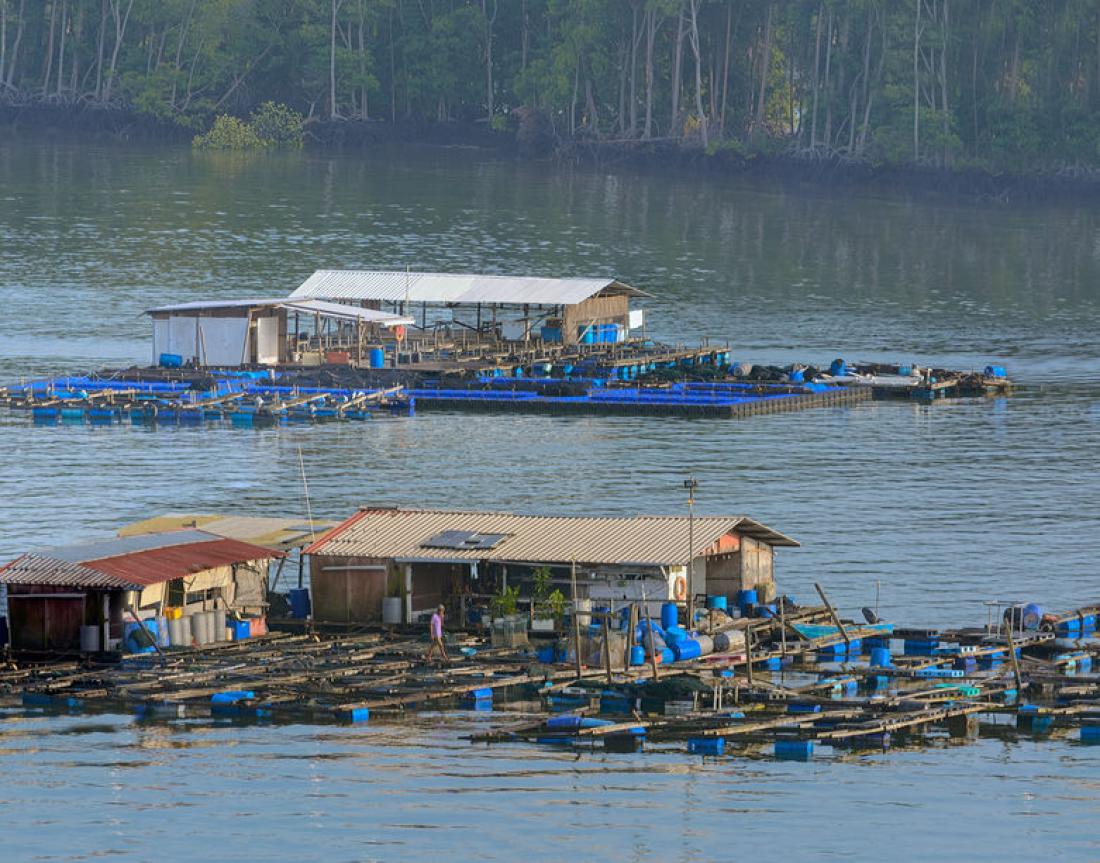A recent study finds that brackish water fish farmers in Malaysia earn more than fresh water fish farmers.
Small-scale fish farmers in Malaysia earn 2.5 times more farming aquaculture in brackish-water, compared to fresh water, according to a study in the Pertanika Journal of Social Sciences & Humanities.
Aquaculture is a common source of income in Malaysia and Roslina Kamaruddin, a researcher from Universiti Utara Malaysia, wanted to understand why some fish farmers are more successful than others.
Kamaruddin queried 216 small–scale freshwater and brackish-water pond fish farmers from the state of Kedah about their assets, such as education and investment capital, fishing strategies, and household income.
Overall, higher education level and experience, as well as higher investment and operating costs positively correlated with higher levels of best management practices and household income. The highest incomes were among brackish-water fish farmers – in part because brackish-water species generate higher profits, but also because brackish-water farmers are more likely to use best management practices than freshwater farmers. Brackish-water species require intensive care, so farmers use best management practices such as pond preparation and fish health management to help ensure high survival rate and best quality produce. “Good management is crucial for sustainable aquaculture and this study showed that fish farmers need more training and financial support to implement best practises,” Kamaruddin said.
While brackish-water species generate more profit, they also require high investment, operating costs and technical knowledge. More brackish-water farmers are financed by banks and agencies, whereas freshwater farmers are more likely to use personal financial resources. Freshwater fish farmers often supplement their income with other sources, such as agriculture. Not all aspects are better for brackish-water farmers, however.
The study shows they experience higher levels of stress, worry and anxiety when their underwater farms were adversely affected. In addition, brackish-water farms had a higher impact on the environment as they used more fertilisers and antibiotics. Measures to boost education, training, and financial investment should be prioritized to improve fish farmers’ livelihood, the study notes. For example, credit institutions could provide credits or loans which cater to small-scale farmers. Training for best aquaculture practises should also be readily available. Other policies could include differentiating between aquaculture products from farms with good management versus poor management, or penalizing farmers who do not follow best practises.
For more information about this research, please contact:
Dr Roslina Kamaruddin
Senior Lecturer School of Economic, Finance and Banking College of Business (COB)
Universiti Utara Malaysia 06010 UUM Sintok Kedah Darul Aman Malaysia
Email: [email protected]
Mobile: +(604) 928 6817
About Pertanika Journal of Social Sciences & Humanities (JSSH)
Pertanika Journal of Social Sciences & Humanities (JSSH) is published by Universiti Putra Malaysia in English and is open to authors around the world regardless of nationality. It is published four times a year in March, June, September and December. Other Pertanika series include Pertanika Journal of Tropical Agricultural Science (JTAS), and Pertanika Journal of Science & Technology (JST). JSSH aims to develop as a pioneer journal for the social sciences with a focus on emerging issues pertaining to the social and behavioural sciences as well as the humanities. Areas relevant to the scope of the journal include Social Sciences—Accounting, anthropology, Archaeology and history, Architecture and habitat, Consumer and family economics, Economics, Education, Finance, Geography, Law, Management studies, Media and communication studies, Political sciences and public policy, Population studies, Psychology, Sociology, Technology management, Tourism; Humanities—Arts and culture, Dance, Historical and civilisation studies, Language and Linguistics, Literature, Music, Philosophy, Religious studies, Sports.
The journal publishes original academic articles dealing with research on issues of worldwide relevance. The journals cater for scientists, professors, researchers, post-docs, scholars and students who wish to promote and communicate advances in the fields of Social Sciences & Humanities research. Website (link below). The paper is available from the link below.
For more information about the journal, contact:
The Chief Executive Editor (UPM Journals)
Pertanika Journal Office of the Deputy Vice Chancellor (R&I)
IDEA Tower II, UPM-MDTC, Putra Science Park Universiti
Putra Malaysia 43400 Serdang, Selangor Darul Ehsan MALAYSIA.
Phone: +(603) 8947 1622
Email: [email protected]
Date of Release: 5 December 2018
Acknowledgements The Chief Executive Editor, UPM Journals



